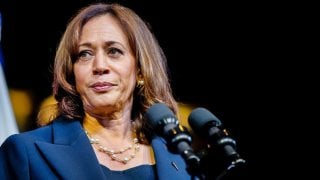Would a President Kamala Harris Offer a Fresh Approach to North Korea?
The Korean peninsula will certainly not be Harris’s highest priority if she assumes the presidency. Resolving the conflicts between Israel and Hamas, aiding Ukraine, and managing competition with China will take precedence. Yet, lurking somewhere in the background is the problem that Biden ignores.
When newly inaugurated presidents come from the same political party as their predecessors, they inevitably aim to show that their policies will be more than old wine in new bottles. If Vice President Harris manages to defeat Donald Trump in November, she will no doubt seek to create her legacy and distinguish herself from President Biden on some issues. No foreign policy issue more urgently demands a fresh approach than North Korea and its nuclear program.
Kamala Harris and the North Korea Challenge
The Korean peninsula will certainly not be Harris’s highest priority if she assumes the presidency. Resolving the conflicts between Israel and Hamas, aiding Ukraine, and managing competition with China will take precedence. Yet, lurking somewhere in the background is the problem that Biden ignores.
The Biden administration’s disinclination to pursue diplomacy with Pyongyang was likely a reaction to former President Trump’s sometimes audacious bromance with its mercurial leader. One of the main Democratic criticisms of the Trump administration had been its seeming preference for dictators over democratic leaders. Biden immediately set himself apart from his election opponent by restoring America’s relationships with its allies and building coalitions against authoritarian rivals.
Yet, in its eagerness to make a 180-degree turn away from Trump’s policies, the Biden administration never asked itself whether anything could still be gained by talking to Pyongyang. Negotiations might not have brought about a diplomatic triumph, but they certainly would not have made things worse than they are now. During the last few year years, the Kim regime has stepped up its missile tests while cozying up to Putin and improving ties with Beijing.
The Shoulds and Should Nots
Fortunately, while Harris isn’t likely to fall in love with Kim Jong Un, her foreign policy team should make a more honest assessment of the ups and downs of Trump’s summitry with North Korea. Trump’s instinct to pursue diplomacy with North Korea was not a bad one, but the execution of the policy was a disaster. The problem was that Trump’s foreign policy team included too many traditional neo-conservatives such as National Security Advisor (NSA) John Bolton, whose hardline views pulled the administration away from meaningful negotiation. A real opportunity to improve relations was lost.
As a potential president, Harris would face a more challenging international environment than Trump's in 2018. During the last six years, there has been a sharpening global divide between rival democratic and authoritarian forces, with the United States, NATO, and allies such as South Korea and Israel on one side and authoritarian regimes such as China, Russia, Iran, and its proxies on the other. North Korea’s natural tendency will be to move closer to other authoritarian governments, which can prevent its demise.
In such a world, asking whether engagement is even worth trying is not unreasonable. A Harris administration probably won’t be able to accomplish anything quickly with North Korea. Yet, continuing to neglect the problem will only ensure that we stay on the dangerous trajectory that we are currently on. Harris should keep in mind that past Sino-Russian alignments have not been very durable and that patience may be rewarded despite the growing polarization of international politics.
If elected, Harris should strategically seek opportunities to engage with North Korea. She must be more attentive to the issue than Biden and less grandiloquent about it than Trump. She should also remain in close consultation with Tokyo and Seoul about the process, even if it sometimes requires bilateral meetings between Washington and Pyongyang.
What A Kamala Harris/North Korea Deal Could Look Like
Her administration could start by seeking a modest deal that achieves limited objectives but serves as a basis for building trust. For instance, she might offer to lift some sanctions that primarily impact civilian economic activity and cancel some military exercises in exchange for a halt to North Korean missile launches.
If the deal is carried out faithfully for a specified period, it could be expanded to include objectives that are more significant to both sides. For the United States, this would mean taking steps toward the dismantlement of North Korea’s nuclear program while for the DPRK this would likely mean normalizing relations and officially ending the Korean War.
Through a measured and realistic approach to engagement with Pyongyang, America’s potential first female president could ultimately tackle a problematic situation that her male predecessors have repeatedly fumbeled or punted on.
About the Author
Gregg Brazinsky is Professor of History and International Affairs at The George Washington University.
Image Credit: Creative Commons and/or Shutterstock.


